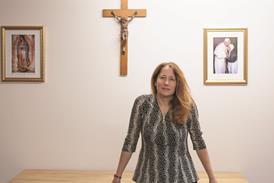There are many ways to assess how important beauty and appearance are in today’s culture. One is to look at early episodes of Top of the Pops. Once upon a time, it was quite sufficient for a pop star to have a good voice and a bit of stage presence: dodgy dancing, an unremarkable face and questionable dress sense were fairly standard. But today’s stars are stylised beyond recognition. The surprise of seeing glamorous stars with no make-up on and wearing jogging bottoms in the celeb rags betrays how removed from reality their usual airbrushed image is.
The music industry reflects our society. The number of people undergoing plastic surgery for cosmetic reasons is rapidly increasing. A survey by thelab.tv in 2005 found that 63% of the 1,000 young girls surveyed wanted to be glamour models. The presentation of image and beauty as a measure of a person’s worth is insidious. Think of typical films. The main characters are usually the most attractive.
We see gorgeous people so often that it becomes normal. Worse; a number of books have been published recently that describe the impact looks have on one’s life and career. The Beauty Bias: The Injustice of Appearance in Life and Law by Deborah L Rhode (Oxford University Press) reports that people deemed less attractive are less likely to be hired or promoted, and are judged to have less desirable personality traits such as goodness, kindness and honesty.
Normal?
In a culture where exceptional beauty is portrayed as normal, how does this make the rest of us feel? Or what if you have some kind of disability? Joanna Jepson, a life coach, Anglican priest and associate of London College of Fashion, had a jaw deformity in her youth that has since been corrected through surgery. She felt she was ‘less than’ acceptable because of her appearance. ‘In school I experienced a pecking order with looks as the currency,’ she says. ‘You learn and find out through the way other people treat you where you belong in the order of things. I more or less had an emotional and physical breakdown because of the exhaustion of being bullied and abused [due to] the way I looked.’
The impact on an individual in regards to how attractive they are is demonstrated by Katie Piper, a model who was viciously assaulted by an ex-boyfriend, who arranged for acid to be thrown into her face. She suffered severe burns and is extremely disfigured. In Channel 4’s alternative Christmas message of 2009, she said, ‘I’ve walked two different sides of life. Before, I was always being chatted up. Immediately after the attack people didn’t want to get in a lift with me. I’ve had doors slammed in my face. Yet I’m not any different.’
Arianna Walker, the executive director of Mercy Ministries UK, works with many women who are in deep pain, and often hate the way they look. ‘Six years ago…at a conference, this girl came up to me, and she said, “I look in the mirror and I hate what I see.” I said, “What do you see?” She said a sentence that changed my world for [the] next six years: “I see a fat and ugly girl who is worth nothing.”
‘The way the world views us, as women, is very harmful. We’re constantly presented with an unattainable standard of beauty…it becomes a really corrosive effect on our identity, because we’re constantly told we’re failing. I come across so many girls who strive to be accepted and who manipulate their body shape and size in order to find an ounce of self-worth.’
Biblical Beauty
The Bible does not seem to consider a person’s looks so important. We know that Jesus is compellingly attractive, but it wasn’t for his physical attributes. Isaiah 53:2 tells us, ‘There was nothing beautiful or majestic about his appearance, nothing to attract us to him’ (NLT). ‘Jesus is not someone who would be on magazine covers today,’ says Brett McCracken, author of the book, Hipster Christianity: When Church and Cool Collide (Baker Books). ‘What is truly beautiful about our faith is Jesus being broken for our iniquities, that selflessness…that sacrificial love.’
So does the Bible say that we must completely ignore what we look like? Is it sinful for women to wear make-up, fashionable clothes or jewellery? Saint Paul seemed to think so: ‘I also want women to dress modestly, with decency and propriety, not with braided hair or gold or pearls or expensive clothes, but with good deeds, appropriate for women who profess to worship God,’ says 1 Timothy 2:9–10 while 1 Peter 3:3-4 declares: ‘Your beauty should not come from outward adornment, such as braided hair and the wearing of gold jewellery and fine clothes. Instead, it should be that of your inner self, the unfading beauty of a gentle and quiet spirit, which is of great worth in God’s sight.’ These passages can raise a great deal of angst for Christian women in today’s image-obsessed culture. ‘Often women get in touch with me about how they have this internal wrestle with their desire to get involved in the beauty industry…or just…caring how they look and spending money on clothes,’ says Jepson.
She argues that there is nothing wrong with being drawn to beauty, in and of itself; the problem is the way it is used and distorted in our fallen world. ‘Beauty in itself is an echo that points to something beyond us,’ she says. ‘It is an echo of Eden. Like everything that God has made that is a good gift, everything is also up for distortion…beauty has become a weapon, a currency, a kind of self-destructive voice inside our head telling us…“Your husband is never going to fancy you above all others.”’
Perhaps the Bible’s instruction is a warning about the reasons for attending to our outer appearance. ‘I think we should care about what we look like,’ says Walker. ‘Wear make-up if you want to. Look after your skin and your hair. But…don’t do these things so you can be accepted and feel good, [but] because you…are grateful for what God has given you.’
Liz Warom, a Christian and the founder of beauty products company Temple Spa, sees no contradiction between her job and her faith. ‘I believe you only have one life, and you have a responsibility to live it to the full and look after the temple which houses your life,’ she says. ‘That means doing your best, looking your best, and using what you’ve been given.’
Rather than dumping your entire cosmetics shelf down the drain and trading your wardrobe for a few sack-like smocks, it might be worth instead examining the motivations and assumptions you have about what you wear. Are you dressing to attract the opposite sex? Or to look ‘cool’ or exclusive and separate yourself out from the masses? ‘When [appearance] is used as a way to elicit a response, whether that be attraction or jealousy or alienation, then I think it is negative,’ says McCracken. ‘I think it is tragic that we put beautiful things to work in a mercenary way… So often…we’re using things to meet the goals of our prideful self. That can be dangerous and damaging.
‘I think the Bible isn’t against beauty…as Christians, we shouldn’t just write beauty off as superfluous. If you look at creation, flowers didn’t need to be as beautiful as they are. You see our God as a God who appreciates unnecessary, extravagant beauty.’
What the Bible, and the passages of 1 Peter and 1 Timothy can do, is give us self-esteem that does not depend on how we appear on the outside. ‘People are radiant and beautiful because they are at home in their own skin and who they are,’ says Jepson, ‘and they’re not trying to be what they’re not. Some nuns I lived with were beautiful and radiant. It doesn’t come down to a normative symmetry of bone structure.’
Super-Cool Church
Our image-conscious culture has entered the Church. Cliff Richard was a looker in his day, but your typical preacher wasn’t. Now we have some worship leaders and pastors who are coiffed, styled and handsome; the women, trendy and pretty. Churches are architecturally attractive and publications expertly designed. As McCracken outlines in his book, this new wave of beautiful, trendy churches is part of a reaction to the decline in faith in modern society. He is sceptical of this new approach, but the argument is that it attracts more people. ‘Some of the people who have responded negatively to my book have said we have to meet the culture where we’re at, and dialogue on their level; if that means dressing [how] they are dressing, if it’s communicating the gospel, it’s worth it,’ he says.
Paul says in 1 Corinthians 9:22-23, ‘I try to find common ground with everyone, doing everything I can to save some. I do everything to spread the Good News and share in its blessings.’ And Joanna Collicutt McGrath, a clinical psychologist, says that for similar reasons, there might be justification in being image-conscious – as long as the products we buy are ethically produced. ‘Our current society is very obsessed by image, especially body image, and as at all times in our history, the job of the Christian is to get into that society, inhabit it, but point beyond it,’ she says.
But there are pitfalls to being a super-cool church with a great image. ‘We have to…think why are people coming here?’ says McCracken. ‘We can’t trick them into thinking Christianity is a great cool party. We can’t hide the verses about denying yourself, that’s what Christianity is.’
The effect of looking cool can also alienate others. ‘I went to churches where so many people were dressed in a self-consciously hip way, I felt like an outsider there and couldn’t feel at ease,’ says McCracken. ‘I think that’s really unfortunate for a church to ever exude that feeling.’
Blessing or a Curse?
There are downsides to being beautiful. ‘In my early teen years, I became obsessed with achieving sensual beauty and gaining guys’ attention,’ says Leslie Ludy, author of The Lost Art of True Beauty (Harvest House). ‘I desperately wanted to be seen as desirable. No matter how many guys showed interest in me, there were always scores of other girls that got far more male approval than I did. And inwardly, I was miserable.’
Ludy was inspired by a woman who had a different kind of beauty, and asked for God’s forgiveness. She says: ‘The world says that sensuality equals beauty. God’s pattern for feminine beauty is entirely different. A woman who has been transformed by Christ from the inside out will shine with a loveliness and radiance that lasts long after her outward beauty fades.’
Not relying on our looks for attention and praise can also help us to be more reliant on God for love and acceptance. ‘The gospel teaches that we are ok not because of how we look or what we earn or how many friends we have or how clever we are, but simply because God loves us, and because of Jesus, God can be on our side without compromising his own integrity,’ says Collicutt McGrath, who co-authored the book Self-Esteem: The Cross and Christian Confidence (IVP). ‘But it is very hard for some people to receive this good news at the level of feelings because of their psychological history, even if they know it in their heads…Part of the journey into holiness – from flesh to spirit – is to learn to accept this unconditional love.’
Taking it further
Joanna Jepson gives talks and coaching to women and teenagers on body image and spirituality. She can be contacted on joeyjep@yahoo.com
mercyministries.co.uk
Mercy Ministries is a national charity dedicated to providing a six-month residential Christian discipleship programme for young women suffering from life-controlling issues, such as eating disorders, self-harm, depression, and the effects of abuse in all its forms. Tel: 01535 642 042
Its director, Arianna Walker, has written a book on the subject; Mirror Image; breaking free from false reflections (Presence Books)



























